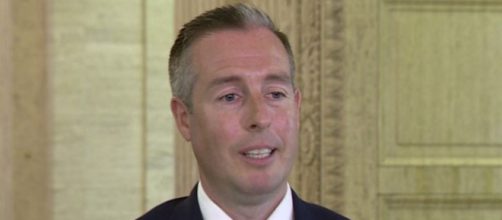The current state of politics in Northern Ireland is in a bit of a precarious place. Something that's not altogether unusual for the region. Though the country's biggest political party, the Democratic Unionist Party, had been under steady leadership for over a decade.
That situation has rapidly changed in recent weeks. For reasons that include Brexit and the COVID-19 pandemic, the DUP has new leadership. And seeing as it's the party in charge, that means new leadership for Northern Ireland as well.
Givan nominated to be the new first minister
Paul Givan has been put forward as the nominee to be the next first minister of Northern Ireland.
The office could be roughly equated to that of an American governor or Canadian premier.
Arlene Foster currently remains the first minister, though she's already given her resignation. It came after she lost her longtime job as leader of the DUP. Shortly after, longtime Deputy Leader Nigel Dodds announced he was stepping down from his leadership role in the party.
Agriculture Minister Edwin Poots was elected to succeed Foster. Belfast North MLA Paul Bradley was chosen to follow Dodds. But, in a surprise move to some, Poots decided not to become the new first minister himself. Instead, choosing to appoint one of his party members to the role and ultimately settling on Givan.
Poots and Givan have a long history.
Both currently represent Lagan Valley in the Northern Ireland Assembly. Before joining the Assembly, Paul Givan had been a staffer for Poots.
Givan becoming the first minister isn't necessarily automatically guaranteed, indicate the Associated Press. It also requires the approval of Northern Ireland's next-biggest political party, Sinn Fein.
The DUP and Sinn Fein, though very different parties, have been operating under a power-sharing agreement. The right-of-center DUP proudly supports the union with Great Britain. Meanwhile, Sinn Fein is a left-wing Irish nationalist party.
The parties themselves have been known to clash from time to time. Givan personally became a target for Sinn Fein over a language policy.
He cut funding for an organization known as Liofa. The organization is geared toward teaching people to become fluent in the historical Irish language of Gaeilge. The Irish national party did not appreciate the move.
Not even 40 years old, pundits have made several comments on Paul Givan's age. Even Givan's father has expressed his hesitations about it to the BBC. Andrew Givan said he worried that the potential job has "come a bit too early" for his son. Also saying that "it's a lot of pressure on reasonably young shoulders."
Givan is a former minister for communities
Paul Givan's career in elected political began in 2005. That year, he was elected to the city council of Lisburn in the Belfast area.
He would remain a member of the council until 2013.
In 2010, he became a member of the Northern Ireland Assembly. He gained his seat in the Assembly after the resignation of Jeffrey Donaldson. Donaldson had served double-duty in the Assembly and the UK Parliament for several years. He opted to focus on his role in the UK Parliament. He's since become the DUP leader in that legislative body.
From 2016 to 2017, Givan was minister for communities of Northern Ireland. He served under Foster in the role. Before formally going into politics, Givan graduated from the University of Ulster.


